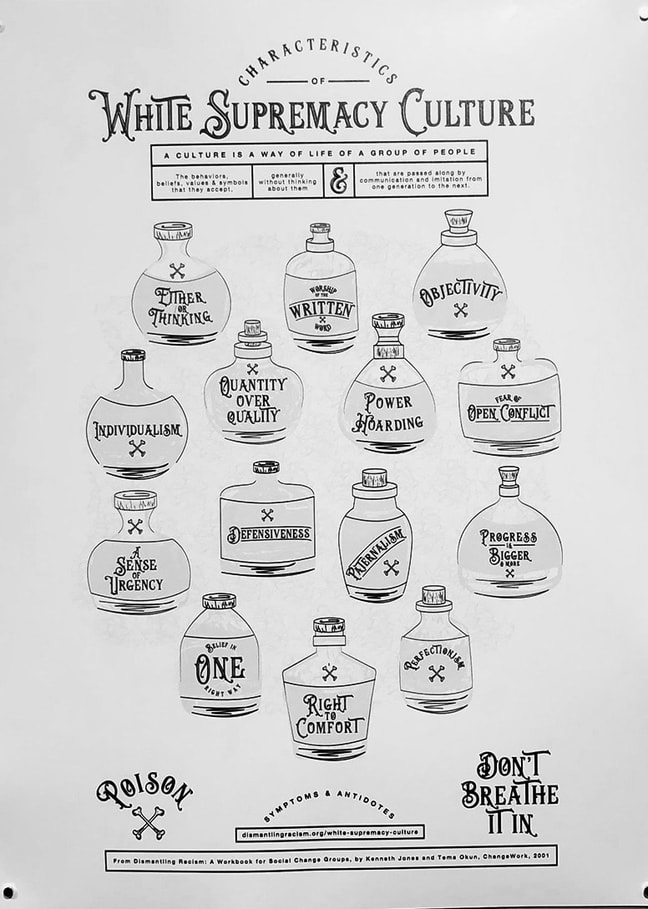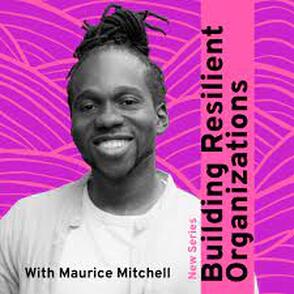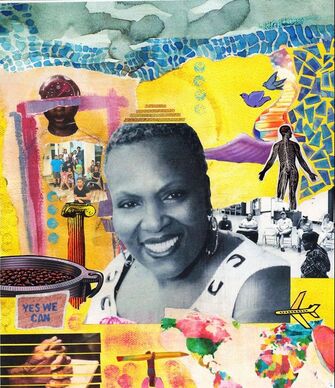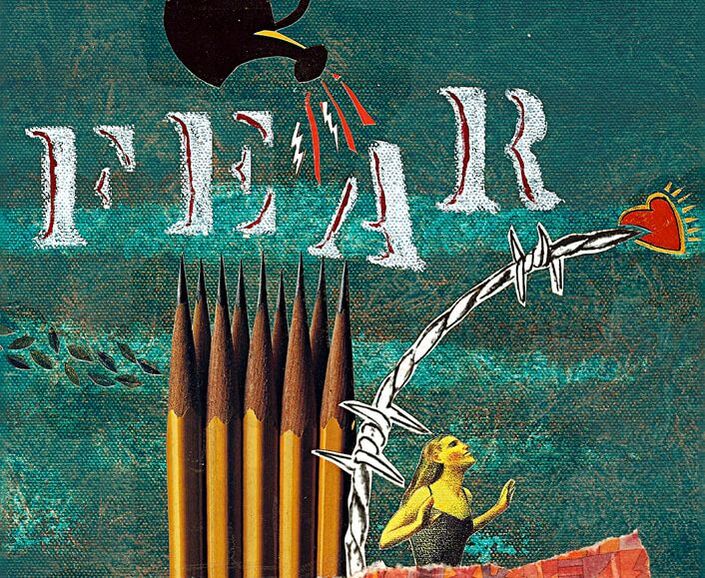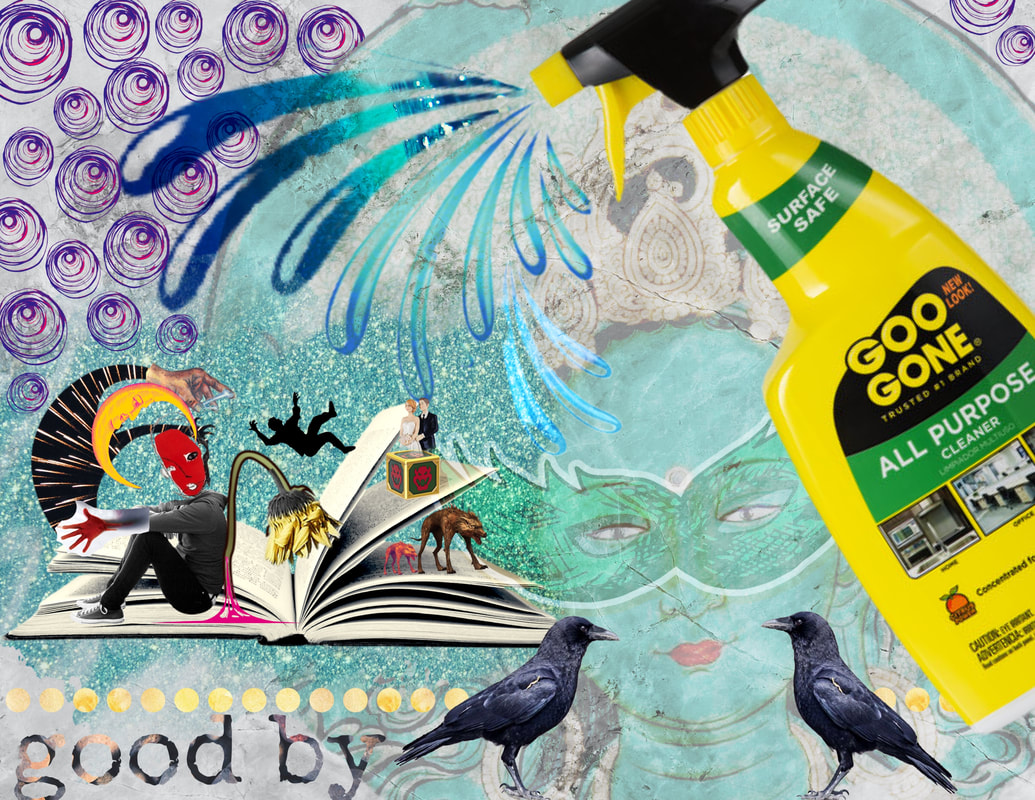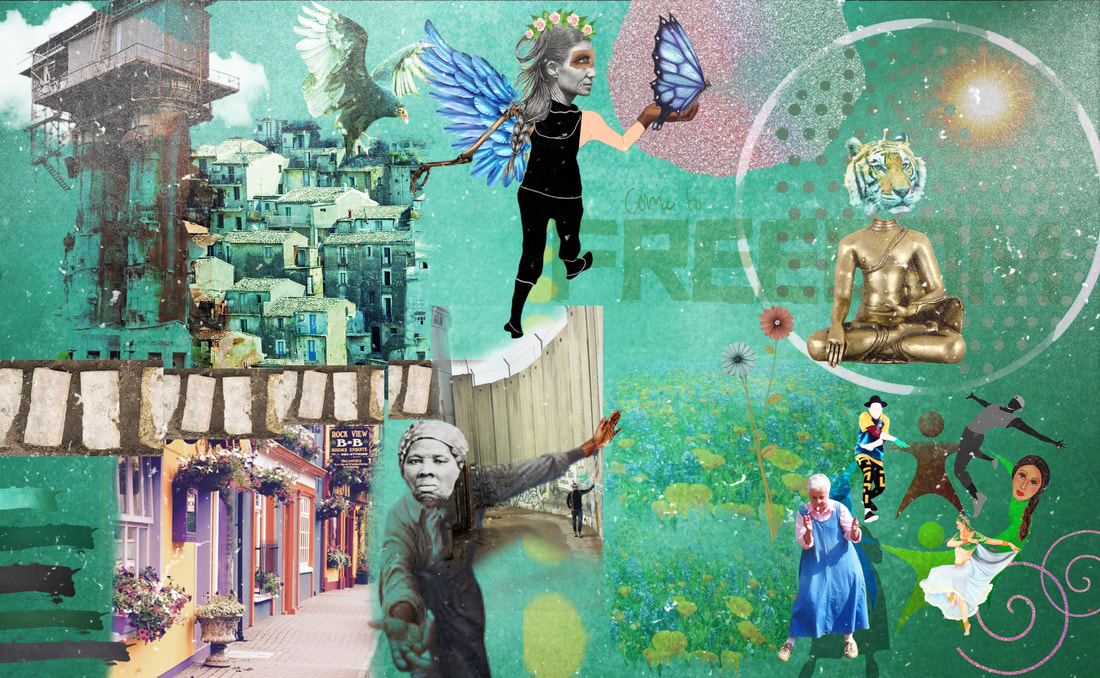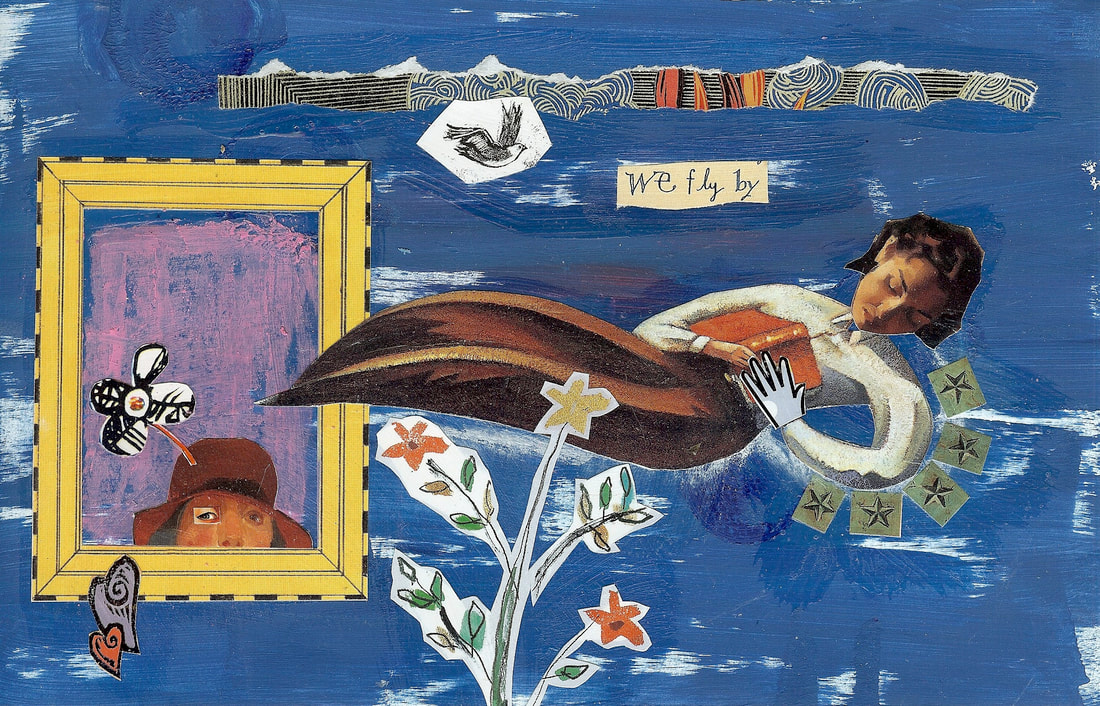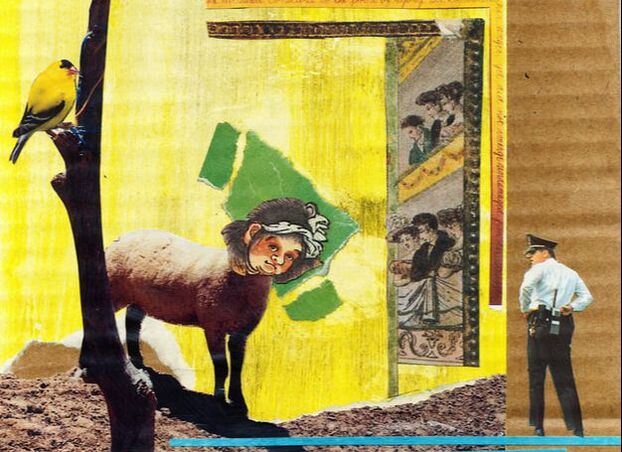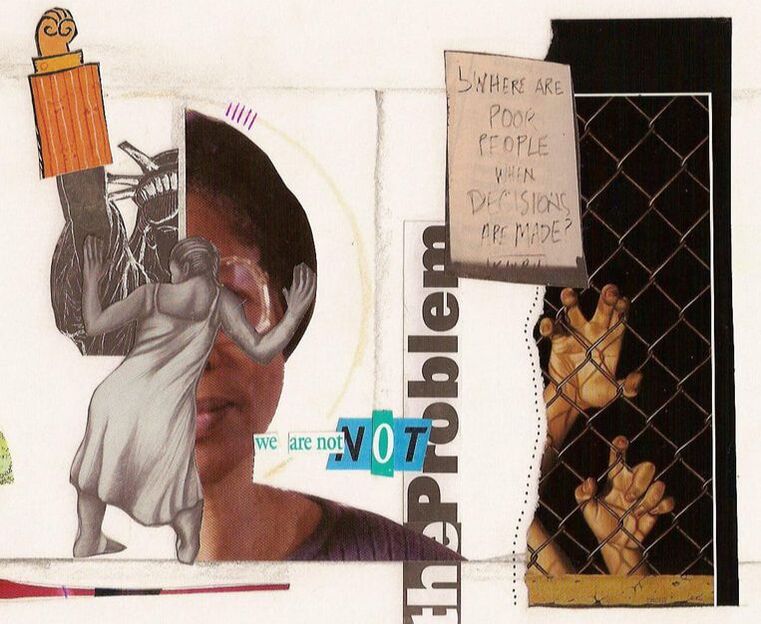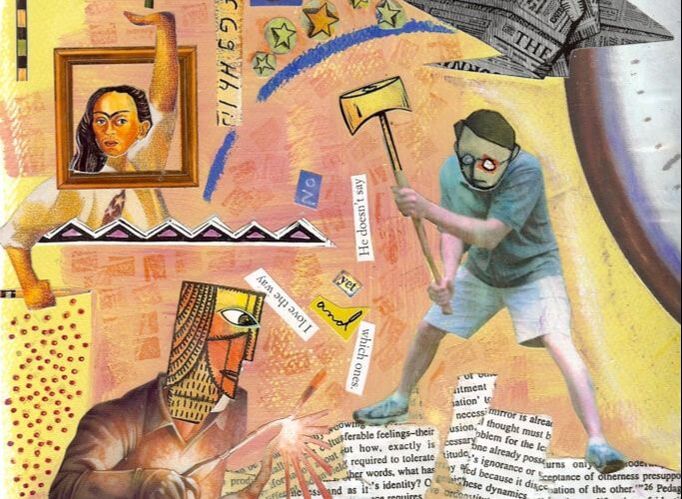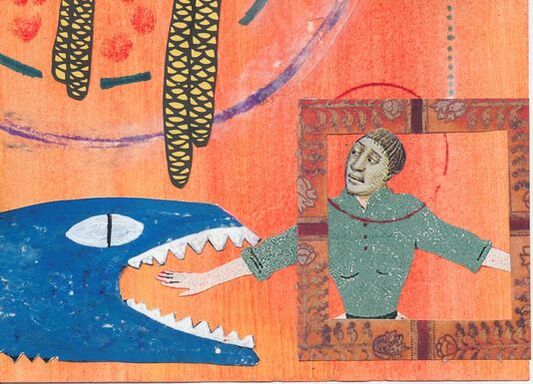|
Sometime in the late 1990s, I arrived home after a particularly frustrating consultation with an organization I was working with at the time. In a flurry of exasperation, I sat down at my computer and typed, the words flowing of their own accord into a quick and dirty listing of some of the characteristics of white supremacy culture that show up in our organizations and communities and homes. The paper I wrote in such a frenzy on that afternoon so many years ago lists 15 behaviors, all of them interconnected and mutually reinforcing – perfectionism, a sense of urgency, defensiveness and/or denial, quantity over quality, worship of the written word, the belief in one “right” way, paternalism, either/or binary thinking, power hoarding, fear of open conflict, individualism, progress defined as more, the right to profit, objectivity, and the right to comfort. The tragic relevance of the list was reinforced a few years later when I was co-facilitating a workshop at a national conference of progressive attorneys and law students. We asked participants to work in small groups, looking for ways in which these characteristics show up in their personal and organizational lives. Asked to report, one young student spoke for her group, sharing that the list represents all the characteristics taught by law schools as essential to success in the profession. And that’s exactly the point – our institutions not only value these characteristics, they to some extent require them and constantly reproduce them in order to benefit from them (thank you for this clarity Alexis Pauline-Gumbs), which is why they are so prevalent in our culture and institutions.
As I say elsewhere on this site, I have revised, updated, added to the original article and the result is this website. I've grouped some characteristics together, although they all intersect. You can use the buttons at the very bottom of the page to explore each of the different pages about the characteristics. You will also find a downloadable print version of the characteristics below the buttons. Art by Melanie G. S. Walby
|
While white supremacy culture affects us all, harms us all, and is toxic to us all, it does not affect, harm, and violate us in the same way. White supremacy targets and violates BIPOC people and communities with the intent to destroy them directly; white supremacy targets and violates white people with a persistent invitation to collude that will inevitably destroy their humanity. Our experience of white supremacy culture and our navigation of white supremacy culture is very different based on who we are and our lived experience, our race, our class, our gender, our sexuality, our religion ... all the ways that the ruling class power elite use identity to define who is human and who is not, as well as all the ways in which oppressions intersect. White supremacy culture is inextricably linked to all the other oppressions - capitalism, sexism, class and gender oppression, ableism, ageism, Christian hegemony - these and more are all interconnected and intersected and stirred together in a toxic brew that is reflected in our devastation of the air and water and land and living beings we have and are destroying and disregarding in the name of profit and power. This brew is a cancer, a dis-ease, an addiction, an infliction and it infects everything with and without our awareness. The miracle is that we have survived as well as we have, the miracle is our ancestors who have fought to remember who we really are, the miracle is the earth and wind and water that restores itself in soft and fierce determination to keep us all whole. And we are all impacted. And we are all impacted uniquely. And we are all impacted collectively. And we are all impacted differently. I do understand the limits in being able to communicate the impact of white supremacy culture on you, the current reader of this website. I hope you find some support for navigating your lived experience here. |
|
I have come to understand that some people, when introduced to the White Supremacy Culture article and its list of characteristics, respond with anger, thinking that my goal in listing the characteristics is to shame or blame. Sometimes people are angry about being connected to any of the characteristics, feeling that to admit we have perfectionist tendencies or a belief that our way is the right way makes us bad.
Sometimes readers are angry because they believe I am suggesting that BIPOC people and communities cannot achieve or accomplish at the same level or standard as white people. Some readers equate perfectionism with excellence and think I am saying that BIPOC people and communities cannot demonstrate excellence. They think I am saying that worship of the written word is the same as the ability to write well, and therefore I am implying that those who are BIPOC cannot achieve a high standard of written expression (whatever standard of "high" might be in the reader's mind). I do not mean or intend any of these, although as we all know, my intention has little to do with my impact. My intention is to say that white supremacy culture trains us all to internalize attitudes and behaviors that do not serve any of us. A belief that we can be perfect, or should be perfect, raises the questions: who decides what perfect is? why would we want to be perfect? Worship of the written word is not in any way associated with the ability to write well. Worship of the written word is a cultural belief that something only has meaning if it is written down, and only if it is written down according to a certain very "white" standard in a certain very "white" way. This belief leads us to ignore and devalue all the wisdom that comes to us intuitively, through our bodies, through story, music, film, and song. Through slang. Through humor. Through children's games. Through prayer. Through Spanish or Arabic or so many other languages, including the ones that communities are working to restore. To think we can or should be perfect, to worship the written word, to insist on one right way, to demand comfort when we are causing harm - any and all of the characteristics on the list are designed to make us forget that we have access to multiple ways of being and knowing, ways that white supremacy has suppressed and oppressed for the purpose of creating confusion about what is important while encouraging us to forget what we already know. The challenge, as you will read in one of my stories, is that most of our institutions and professions have defined success based on these characteristics. As a result, a "good professional" is someone who is perfectionistic and individualistic, insists their way is the right way because they are the "expert," complies with and requires a certain kind of writing, defends against criticism, thinks that to make a mistake is to be a mistake. As someone who struggled in school, I understand (or at least I think I do) the effort so many of us have made to fit into the professional characteristics that we've been told are critical to our ability to thrive in our fields. I no longer believe these characteristics reflect our actual genius and brilliance; I believe they are designed to at best contain and at worst distort us. Our relationship to the idea of professionalism is shaped by race, class, gender, and how institutions have welcomed us or barred us or required us to assimilate or refused (and often continue to refuse) to acknowledge us. My desire here is that we redefine professionalism (or my preference would be to reject it altogether) so that we define the expectations we have of ourselves and each other. I applaud any and all of us who bring high standards, who aspire to excellence, who take care with our writing, as did all of my mentors dead and alive - Audre Lorde, James Baldwin, Pearl Cleage, Dorothy Allison, Gloria Anzaldua, Leslie Feinstein - the list goes on and on. So I am not saying anything about anyone's abilities. I am also not saying anything about what we have to do to excel in our work (or any other area of our lives) if that is important to us. I am saying that we have been hoodwinked, all of us, about what is really important. And I am deeply moved by any and all of us who strive to be our best selves - in our writing, in our research, in how we manage or coordinate or teach or iron or grow food or wash the floors or care for little ones or attend the sick. I am deeply moved by our ambition and desire to be seen and heard and valued in our full embodied excellence. I am saying that any attempt to be perfect is in fact a fool's errand (not that we are fools) because learning from our mistakes is how we grow and learn and lean into our glorious and flawed humanity. We can never be perfect when perfection is defined by others, particularly by institutions and cultures that do not care about or for us. We are, in fact, already perfect. We were born perfect. No striving necessary. We are strongest when we are allowed to be vulnerable - with ourselves and each other. White supremacy culture does not allow for vulnerability. And that is a tragedy for us all. We can and do and will build a culture - a set of beliefs and values and standards - that we define collectively, based on mutual interdependence and interests, a commitment to working through conflict, and many other ways of being to which we aspire as we build a just and loving world. For examples of organizations that have developed strong shared values, take a look at Black Lives Matter, Southerners on New Ground, and Showing Up For Racial Justice. |
|
|
I want to offer a cautionary plea here about weaponizing this list.
This website, the article, the information offered here is a tool, an analytical tool designed to help us better understand white supremacy culture. The intention is to help us understand the water in which we are all swimming so that we can collaboratively work together to build and sustain cultures that help us thrive as communities and individuals. Cultures that are not based on abuse of power and accumulation of profit. Cultures that are based on interdependence, justice, and respect for each other and the earth and wind and sun and stars. Cultures that embody the belief that we all do better when we all do better. I remember how, in my early years of working with Kenneth Jones to offer dismantling racism training, people would take the analysis and framework we offered and use it to beat each other up - "My analysis is better than your analysis," "I am/we are more righteous than you." Similarly, some people report that this list gets used as a weapon to accuse, shame, and blame in ways that perpetuate disconnection. I believe we are all deeply harmed by white supremacy culture. I am asking us to sit with the devastating impacts of white supremacy culture on all of us even though that impact is very different based on our race, our class, our gender, our sexuality, our lived experiences. One friend reports crying after reading the list as he came to grips with the devastating impacts of white supremacy culture on his white working class family of origin as he was creating a middle class family himself. Another, a skilled facilitator, reports that "I could not possibly tally the number of hours I have spent over the last three years dislodging people from the reductive stance they construct based on the tool. In its current form, just to name one area, it tilts people towards a behavioral and ahistorical frame. And because it couches things in a way that can be read as absolutist, it can generate almost ridiculous orthodoxies of exclusion. I worked in one situation where the communications function had come to a grinding halt because a segment of the staff had decided that editing was white supremacist and, while yes, there are elitist and racist frames around proper language, the organization was locked in an either/or frame that was incredibly unhealthy and unproductive." An activist talks about how the list has been used to scold white people, to tell white people we are inherently problematic and that our work, those of us who are white, is to never trust ourselves. A BIPOC person shares that the list is traumatizing and triggering. A friend told me about an organization where a young white man, new to activism, cited characteristics on the list to target the director, a Black woman with years of lived experience, including unjust imprisonment that she turned into years of deep and grounded organizing. Another told me of a white director targeted by largely BIPOC staff using the list. There are too many stories that tell of using the list in the name of a misguided accountability that reduces it to a cudgel or a hammer. If you are using the list to go after someone, then you are misusing it. Use the list to better understand your own conditioning. Use the list collaboratively and collectively to support your vision for the liberatory culture that you want to build. Use the list to better understand how we unintentionally and unconsciously reproduce white supremacy culture when the constraints of that culture keep us boxed in. Bring to mind the racial equity principle of the importance of accountability to each other and to principles (see Racial Equity Principles page). Working with each other across lines of difference is really hard. We cause harm, we operate out of our conditioning, we are rightfully enraged, deeply hurt, exhausted. I am not suggesting that living a racial equity commitment is clean or easy. Or that this list is in any way a final word on how white supremacy culture operates. One of the challenges we face as we work together is that building justice is complex and nuanced while white supremacy culture likes to pretend we can reduce everything to a simple either/or. So we are called to navigate the complexity of our conditioning without losing sight of the inherent humanity in each of us. The movement is currently engaged in important conversations about calling in and calling out. I lean on the words of the late and fabulous and fierce and funny Cynthia Brown, a social justice warrior and beloved friend, who told us with her last breaths that we should never throw anyone away. This does not mean we can't hold each other accountable (another word for supporting each other to be our best selves), set boundaries when people have not learned yet to take responsibility for themselves, apologize and take responsibility ourselves when we cause harm, and continue to grow and learn how to be with each other even when we are getting on each other's last nerve. I will say that white supremacy wants us to attack each other as the problem. As we fight with and among each other, we fail to identify the actual problem. An instruction we might hold to is to attack the problem, not the people, not each other (thank you Cal Allen). Of course, sometimes our behavior is a problem, our conditioning is a problem, and then we can, when we are able, help each other through. And if we cannot, we look to others who have the capacity to help or be in relationship as they look to us when they are out of capacity and we are able to show up. I'm not pretending to have easy answers. My point is simply that I hope we can use this list to help us name the ways in which our conditioning might be getting in our own and each other's way rather than as an instrument of shame, blame, or accusation of not being good enough. The dominant culture already gives us plenty of messaging about how deficient and wrong we are; perhaps we can learn to show up to each other with more compassion (and give ourselves and each other a break when we can't). Both/and, my lovelies, both/and. |
Wisdom from Cristina River Chapman
|
White supremacy culture is so common and widespread; the invisible ocean we all must tread. Mi abuela likened it to gravity in conversations about US imperialism in Latin America. This ocean deeply informs what we think and feel and even how we think and feel. It has to. It’s a matter of sink or swim. And for some of us sink means drown. While white supremacy and structural racism are not simple. I would say at the end of the day what white supremacy culture needs me/us to believe is this one thing: The only way for me to swim is someone else has to sink. The implication of this false narrative is that for me to thrive (or just survive or be stable or successful or honorable or good or worthy or lovable etc) requires the suffering, diminishment of others; that our value as humans is not inherent but relative and must be proved. From this place, white supremacy culture gets more complex: sometimes overt, sometimes coded; the hoops we gotta jump to prove our value; the othering and dismembering that we are told is required to survive. |
We have nothing to lose but our chains, so why aren't we letting go?
It is our duty to fight for our freedom. It is our duty to win. We must love each other and support each other. We have nothing to lose but our chains. Assata Shakur
|
If I’m good at any white supremacy cultural norms, if I can code switch like a boss, then I just might get lifted up. I might be deemed professional, rational, respectable, intelligent, hard working, good, worthy etc at my job, in my community, family etc. For folks pushed to margins, when we receive this kind of praise, it is, of course, in spite of our marginalized identities in a dynamic we call exceptionalism. Some of us can build a whole identity, a career, a survival plan on a commitment to white supremacy cultural norms. We accept a rationale that the others are sinking because they are not professional enough, not hard working enough, not smart enough, not enough, not enough... And if I am struggling to prove my enough-ness. And if enough-ness means I sink or swim, then at least let me prove there’s someone who’s less enough.than.me. And there it is: the more I subscribe to white supremacy culture the more I need to subscribe to white supremacy culture... F*ck. |
But for real, we have nothing to lose but our chains and
we have so much to gain!
And what is also True... The better we are at releasing white supremacy values, the better we are at releasing white supremacy values. Because we are/have whole galaxies and spectra of norms, values, culture that open up to us simply by, for example, releasing either/or. Because when I know I am enough (PERIOD), I never gotta ask anyone to shrink or be silenced or cut off pieces of themselves. Because the end game of dismantling white supremacy is getting free together. We all get to swim.
In the face of scarcity, loss of self, fear, we can practice the gifts of getting free (there are so many, here’s just a few). When we let go of white supremacy cultural norms and values, we can:
Hold paradox and multiple realities, nuance ie: leading from behind; I can cause harm and be worthy of love; something can be true and not be my truth.
In the face of scarcity, loss of self, fear, we can practice the gifts of getting free (there are so many, here’s just a few). When we let go of white supremacy cultural norms and values, we can:
Hold paradox and multiple realities, nuance ie: leading from behind; I can cause harm and be worthy of love; something can be true and not be my truth.
- Our stories retain necessary complexity so that we can actually learn from each other. We can stop pretending leaders are flawless, our movement successes don’t also include fuck ups. We know to make space for different experiences of the same event.
- We are less afraid of responsibility and accountability because we value collective structures and are investing in relationships where power is shared.
- We can be powerful and competent and are allowed to say we don’t know and we need help.
- Our movements are more sustainable and able to thrive. We don’t consume our people.
- We are able to respond to crisis rather than always react.
- We receive critique and feedback because we are rested, grounded, and centered enough to listen.
- We see that ALL labor is skilled labor.
- The work of emotional labor is seen and shared.
- We ask for help when we need it and offer help when we can.
- We are infinitely better equipped for the long haul collaborative work of dismantling institutional oppression.
- We get to prioritize relationships and the time it takes to be with each other and ourselves in a meaningful way.
- We expect, practice, hold: mistakes and conflict.
- We expand our definitions of leaders; no longer conflate control and keeping gates with purpose and leadership
- We release ourselves and others of the incredible labor and toxic practice of code switching and dismembering.
- We recognize our own and each other’s gifts and talents and disciplines regardless of capitalism’s valuation.
- We become better and deeper listeners. We grow our emotional intelligence
- We build movements of belonging and alignment because we understand that everyone is inherently worthy.
(some of) THE CHARACTERISTICS of WHITE SUPREMACY CULTURE
The original piece and therefore this website builds on the work of many people, including (but not limited to) Andrea Ayvazian, Bree Carlson, Beverly Daniel Tatum, Eli Dueker, Nancy Emond, Kenneth Jones, Jonn Lunsford, Joan Olsson, David Rogers, James Williams, Sally Yee, as well as the work of Grassroots Leadership, Equity Institute Inc, the People’s Institute for Survival and Beyond, the Challenging White Supremacy workshop, the Lillie Allen Institute, the Western States Center, and the contributions of hundreds of participants in the DR process.
Sharon Martinas, who at the time was facilitating the Challenging White Supremacy Workshop, suggested I add the antidotes. The characteristics marked with an asterisk* indicate those that Daniel Buford, who at the time was a lead trainer with the People's Institute for Survival and Beyond, asked I credit to him when the original article was written.
As noted elsewhere, any wisdom you find here is credit to all those who informed and influenced
the original article and this website. Any fault or shortcoming is mine.
Artwork by Tema Okun
|
FEAR White supremacy culture's number one strategy is to make us afraid. When we are afraid, we lose touch with our power and become more easily manipulated by the promise of an illusory safety. |
ONE RIGHT WAY along with PERFECTIONISM* PATERNALISM OBJECTIVITY* & QUALIFIED The belief there is one right way to do things. Connected to the belief in an objective "perfect" that is both attainable and desirable for everyone. Connected to the belief that I am qualified to know what the perfect right way is for myself and others. |
EITHER/OR & THE BINARY* Reduces the complexity of life and the nuance of our relationships with each other and all living things into either/or, yes or no, right or wrong in ways that reinforce urgency, one right way perfectionist thinking, and abuse of power. |
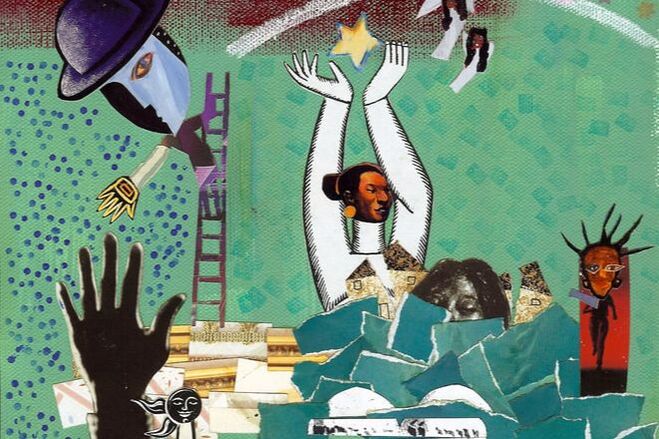
DENIAL & DEFENSIVENESS The habit of denying and defending against the ways in which white supremacy and racism are produced and our individual or collective participation in that production. |
RIGHT TO COMFORT & FEAR OF CONFLICT The internalization that I or we have a right to comfort, which means we cannot tolerate conflict, particularly open conflict. |
INDIVIDUALISM* Our cultural story that we make it on our own, without help, while pulling ourselves up by our own bootstraps, is a toxic denial of our essential interdependence and the reality that we are all in this, literally, together. |
|
PROGRESS IS MORE* & QUANTITY OVER QUALITY* The assumption that the goal is always more and bigger with an emphasis on what we can "objectively" measure as more valuable than the quality of our relationships to all living beings. |
WORSHIP OF WRITTEN WORD Honoring only what is written and even then only what is written to a narrow standard, even when what is written is full of misinformation and lies. An erasure of the wide range of ways we communicate with each other and all living things. |
URGENCY Applying the urgency of racial and social justice to our every day lives in ways that perpetuate power imbalance and disregard for our need to breathe and pause and reflect. |
The original article offered this Partial Bibliography:
Notes from People’s Institute for Survival and Beyond Workshop, Oakland, CA, spring 1999. Notes from Challenging White Supremacy Workshop, San Francisco, CA, spring 1999. Beverly Daniel Tatum, Why Are All the Black Kids Sitting Together in the Cafeteria? NY: HarperCollins, 1997. Derrick Jensen, A Language Older Than Words. NY: Context Books, 2000. Paul Kivel, Uprooting Racism. PA: New Society Publishers, 1996. Anne Wilson Schaef, Living in Process. NY: Ballantine, 1998. For complete bibliography, see complete workbook for dRwork’s Dismantling Racism process (2016).
Notes from People’s Institute for Survival and Beyond Workshop, Oakland, CA, spring 1999. Notes from Challenging White Supremacy Workshop, San Francisco, CA, spring 1999. Beverly Daniel Tatum, Why Are All the Black Kids Sitting Together in the Cafeteria? NY: HarperCollins, 1997. Derrick Jensen, A Language Older Than Words. NY: Context Books, 2000. Paul Kivel, Uprooting Racism. PA: New Society Publishers, 1996. Anne Wilson Schaef, Living in Process. NY: Ballantine, 1998. For complete bibliography, see complete workbook for dRwork’s Dismantling Racism process (2016).
White Supremacy Characteristics - Still Here
is a printable version of the updated characteristics.
|
White Supremacy Culture | Offered by Tema Okun
first published 2021 | last update 8.2023 |
